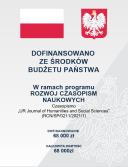Evolution of ethical standards in the press policy of state higher education institutions
DOI:
https://doi.org/10.15584/johass.2019.2.8Keywords:
media, ethics, press, media relations, PR, press officer, universities, communicationAbstract
State higher schools (mainly universities) play a special role in shaping social attitudes. Hence the reasonable conclusion that they themselves must present a high level of ethics. On the one hand, it is not difficult, because moral standards are inscribed in academic life per se. On the other hand, it should be remembered that the academic community consists of very diverse groups, often with divergent interests, which makes it difficult to harmonise existing standards (of course, unification on paper is very easy, but it is about the practical application of norms, preferably in the spirit of categorical imperative – that is, through the internal awareness of necessity of their use). So, the question is – is effective and ethical communication possible at one and the same time?
Downloads
References
Buller L.J., 2003, Rzecznictwo prasowe kontra dziennikarze [w:] Społeczeństwo wirtualne. Społeczeństwo informacyjne, red. R. Szwed, Lublin.
Castels M., 2013, Władza Komunikacji, Warszawa.
Drzycimski A., 2000, Sztuka dyskretnego podpowiadania i pośrednictwa [w:] A. Drzycimski i in., Komunikatorzy. Wpływ, wrażenie, wizerunek, Warszawa–Bydgoszcz.
Gajdka K., 2012, Rzecznik prasowy w otoczeniu mediów. Teoria i praktyka, Kraków.
Gawroński S., 2006, Media relations. Współpraca dziennikarzy i specjalistów PR, Rzeszów.
Gierwazik M., Szalek J., 2002, Rzecznik prasowy a pracownik Public Relations, Poznań.
Pasionek P., 2012, Rzecznik prasowy – zawód na współczesne czasy, „Nasz Dziennik”, 15–16.09.2012.
Pietrzak H., Hałaj J., 2003, Rzecznik prasowy. Teoria i praktyka, Rzeszów.
Rozwadowska B., 2002, Public Relations. Teoria, praktyka, konteksty, Warszawa.
Downloads
Published
How to Cite
Issue
Section
License
Copyright (c) 2019 Wydawnictwo Uniwersytetu Rzeszowskiego

This work is licensed under a Creative Commons Attribution-NonCommercial 4.0 International License.



